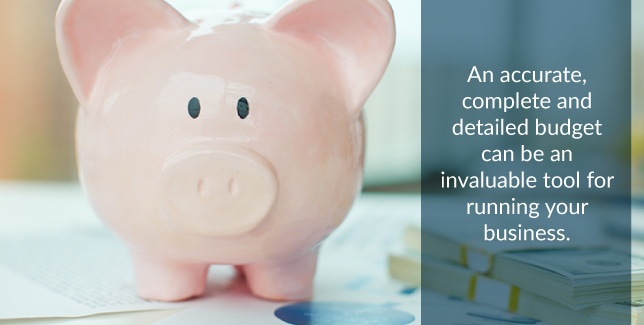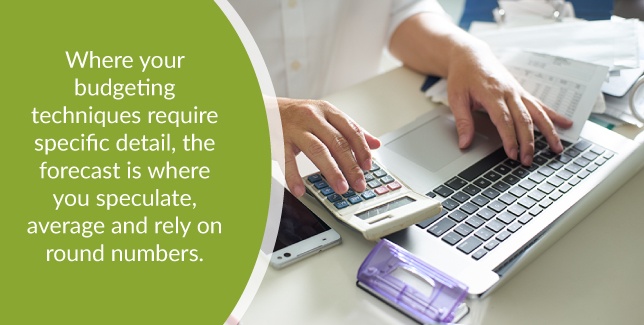Difference Between Budgeting and Forecasting

Business and finance are two interdependent fields yet two separate disciplines. Running a business often means focusing on day to day operations and developing a product line or menu of services within your core area of expertise. Larger financial issues like budgeting and forecasting get pushed aside for many reasons.
The number one reason business owners do not complete their budgeting activities efficiently is a lack of knowledge. Understanding the concepts of budgeting and forecasting is necessary to use their financial tools properly. Without a good foundation of knowledge, preparing a budget or business forecast can end up being an expensive waste of time.
Budgeting Defined
In some contexts, the term budgeting is used pejoratively. For example, when you go over your budget at home and spend more money on entertainment than you allotted, you must make up for that shortfall in the next budgeting cycle. What this usually means is going without any entertainment expenditures for a period of time.
Budgeting in business is the same as home budgeting, just on a grander scale. Creating a budget means listing out the various items you usually spend money on and deciding how much money you can afford to spend on each.

Businesses usually break down a budget into categories. Instead of tracking how much money you spend on paperclips, you put those expenditures into the office supplies category. Office supplies are probably part of operating expenses in your business’s budget.
If your business makes a product, you will have a separate section in your budget for materials, equipment and labor. These are the expenditures necessary to create the product you sell. A service oriented business tends to have fewer tangible expenses in this category. The expenses your business incurs for providing a service may include things like travel, dues in professional associations and the cost of developing intellectual property and maintaining proper trademarks and patents.
Building a budget is generally a forensic exercise. You look back at your records from the previous year and recover information about how much you spent on different items. This is just one reason why it’s important to keep good business records. By grouping your expenditures into relevant categories, you can develop a budget that reconstructs your spending habits from the previous year.
Building a budget for the first time is both more difficult and less accurate. If this is your first year in business, or you are making a significant change in your core business, there are no historic records to uncover. You must rely on estimates for what things cost and anticipate what you will need to spend money on in the coming year. Even though your first budget may not be precise, you develop the framework in these early stages.
Of course, revenue also must be part of your budget. This is what we mean when we talk about balancing the budget, making sure your business is not spending more money than it’s making. In a larger business, it’s best to break this down by department so you can see each segment of the business is controlling spending relative to revenue.
Here are some tips for developing a budget:
- Separate your expenses and sources of revenue into relevant categories. Typical budget categories include: office supplies, communication, postage, equipment, advertising, staff and professional services, but these vary quite a bit from business to business.
- Get detailed. When it comes to finances, more is better, and that goes for information, as well. List each specific expenditure and add them up. Estimating is not a good technique to use on your budget. You should be able to document every dollar spent and not round anything off.
- Do not leave anything out. If you owe money on a loan or mortgage, list it in your budget even if you are not currently making payments. Consider the value of any property the business owns as an asset. You may need to borrow against such assets in the future.
- Be accurate. When including revenue in the budget, only count money already collected. Anything owed but not paid yet will count as revenue in the fiscal year when it comes in.
- Solicit help. A business budgeting company or small business consultant can end up paying for itself in the money and time it saves you in the budgeting process. Often, it’s better to leave financial matters to the experts. They can develop an efficient budgeting process for you or handle the whole thing while you run your day-to-day operations.
Many people are afraid that developing a budget will reveal financial shortfalls or restrict decision-making. A budget is a roadmap — you decide where to drive your business. Without a budget, you’re driving blind. If there are financial shortfalls, you’re better off discovering them right away and using your budget as a tool to improve your finances.
Using Budgeting as a Tool

An accurate, complete and detailed budget can be an invaluable tool for running your business. Although the budget contains historic information about your spending and earnings, it can help you adjust expenditures throughout the year to operate within your means.
One key to using your budget as a tool is to revisit it often. Completing a budget and then putting it in the drawer until the end of the year doesn’t do much to help your business’s bottom line. You have to review your budget at least every quarter. Some businesses maintain a fluid budget and actually adjust it several times throughout the year.
There is no such thing as budget season. You should be working with your budget throughout the year. When you record new expenditures for the current year, compare them to the same expenses in the previous year. Keeping your business financial records up to date and looking at them often will help you maintain an accurate picture of the business and shorten your decision-making process.
When you review your budget, you want to see how your actual spending matches up to the line items. Pay attention to line items that exceed the budgeted limits; those could be the sources of trouble. Try to determine the cause for going over budget in certain areas. Was it wild, unnecessary spending, or did you have to make up for a deficiency in another area?
Look to see where there might be excess money in the budget or where spending fell short of the budgeted amount. That could balance out the over-spend and keep your bottom line in check.
Fluctuations in revenue are another area of the budget that should get your attention. Excess revenue needs to be accounted for in the budget and allocated appropriately. Excess revenue is a good problem to have — until it slips away into some budgeting black hole. When excess revenue is not tracked, it tends to disappear.
Shortfalls also require some attention. Determining the reason for a revenue shortfall could keep it from happening in the following quarter. Shortfalls show you where adjustments should be made. Sometimes a quick change to one aspect of the business, like pushing back a new product launch, can compensate for an unexpected shortfall and keep you on budget.
Forecasting Defined
Another valuable tool for driving your business, a forecast helps you predict and anticipate future performance. Forecasting covers some of the same areas as budgeting but in a more high-level or big-picture way. Creating a business forecast can be a similar process to budgeting. It’s just collecting different information.
Developing a forecast for your business means looking at some of the same line items you included in your budget. In a forecast, you don’t get down to the detail level. Consider only the major items or category headings. Your forecast will give you more of a big-picture view of the business, and the forecast needs to be more fluid than a budget.

The forecast is where all your estimating goes. Where your budgeting techniques require specific detail, the forecast is where you speculate, average and rely on round numbers. Of course, your forecast should be as accurate as possible — it’s just not created on a detail level.
There are financial forecasting services available to help you with this. Business forecasting is sometimes better performed by an outside consultant who can remain objective. If you’re too close to the business, you may be inclined to skew the forecast in the direction you want it to go.
The goal of a forecast is not to paint a rosy picture of the future of your business. Rather, it’s to show you an accurate picture of what your business will look like a couple months down the road if you continue on your current course. The ultimate purpose of a business forecast is to help you change course to arrive at a better future for your business.
A forecast should be built on objective industry information, as well as facts from within your company. A good forecast identifies trends, good and bad, before they happen. These identifications are based, in part, on past performance of your company and the industry as a whole. Think of it as a hybrid of market analysis and business assessment.
You must gather a lot of information to develop a forecast. A cash flow forecasting company can be a helpful part of creating your business forecast. They would focus specifically on your financials, revenue trends and debt ratios. An accurate cash flow forecast could be extremely valuable for knowing when you should plan to come out with a new product line or when it’s best to staff up for future growth.
While your budget gives you solid information about the balance of income and expenditures in your business, a cash flow forecast helps you better anticipate when you will see tough financial conditions. The forecast can also predict an upswing in business for you to take advantage of.
Using Forecasting as a Tool
By determining the health of your business and matching it with market trends, you’re better able to steer your company in the right direction. Making growth or product line decisions partially based on where the market will go and your ability to meet future demands can increase the success of your company.

Going after bigger customers or stronger markets when your business is not prepared to handle the growth could spell disaster. Knowing where there is more money to be made is only one part of the equation. You must understand the strength and weaknesses of your company when deciding how to approach more lucrative areas of business.
The best way to understand the use of forecasting as a tool is to consider a hypothetical scenario. Imagine you run a large business with several departments. As part of your forecasting process, department heads report their impressions of what is happening in their department and make small predictions.
The head of customer relations reports the number of customers your company served last year and the relative amount of business that came from each one. He also mentions that one of your biggest customers has been hinting about a huge expansion that would mean increasing the size of their engagement with your company.
Knowing this, you prepare your production team for a sudden spike in orders. Scaling up the production line, however, is not cheap. If you add extra workers and then the order increase doesn’t happen, you’ll lose money. If the order increase comes before you are ready and you cannot fill it as efficiently as usual, you could lose this valuable customer.
Your forecast should also include some speculations about the industry and the market in general. By matching up some outside research with your inside information about a customer’s potential expansion, you should be able to forecast when you will need to ramp up your efforts to capture the additional business. Having all this information in your forecast makes it easier to adjust your operations when necessary.
Since markets are always fluctuating in any industry, your forecast should always be changing. You need to repeat your research and update the forecast regularly for it to be useful. Making decisions on outdated information can be dangerous in the business world.
Learn More
Don’t be afraid of the financial concepts needed to efficiently run your business. Budgeting and forecasting are essential, but it’s also important that they are done right and used properly. SLC Bookkeeping is here to answer all your questions about the financial records of your company and how to develop better tools for predicting your future.
Our professional staff can help you through the budget process whether this is your first year in business or you’re looking for more accuracy this year. Contact us today to find out how we can make budgeting and forecasting easy for your business. Let us put these essential tools in place for you and show you how to use them.


Comments